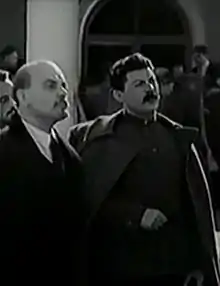The Great Dawn
The Great Dawn (Georgian: დიადი განთიადი, trans. Diadi Gant’iadi; Russian: Великое зарево, trans. Velikoe Zarevo. English-language title: They Wanted Peace.) is a 1938 Soviet Georgian film directed by Mikheil Chiaureli. It is considered a representation of Joseph Stalin's cult of personality.
| The Great Dawn | |
|---|---|
 Konstantin Müfke as Vladimir Lenin and Mikheil Gelovani as Joseph Stalin | |
| Directed by | Mikheil Chiaureli |
| Produced by | L. Totadze |
| Written by | Giorgi Tsagareli |
| Screenplay by | Pyotr Pavlenko, Giorgi Tsagareli |
| Starring | Mikheil Gelovani |
| Music by | Ivane Gokieli |
| Cinematography | Aleqsandre Digmelovi |
| Edited by | E. Gabrieli |
Production company | |
Release date | 6 November 1938 |
Running time | 73 minutes |
| Country | Georgian SSR |
| Language | Russian |
| External image | |
|---|---|
Plot
In 1917, the people of the Russian Empire are no longer willing to fight Germany, but the bourgeois government of Alexander Kerensky is unwilling to defy its imperialist allies and stop the war. Only Vladimir Lenin's Bolshevik Party is resolute in calling for peace. In the front, the soldiers of one battalion elect three delegates to travel to St. Petersburg with donations the troops collected for the Pravda newspaper: Gudushauri, Panasiuk and Ershov. The three arrive in the capital and describe the horrendous conditions in which the soldiers live to Joseph Stalin, Lenin's trusted aide and colleague. They join the Bolsheviks and take part in the storming of the Winter Palace, led by Stalin and Lenin. Stalin announces that the great dawn of revolution has broken.
Cast
- Konstantin Müfke as Vladimir Lenin
- Mikheil Gelovani as Joseph Stalin
- Spartak Bagashvili as Georgi Gudushauri
- Tamara Makarova as Svetlana
- Nutsa Chkheidze as Gudushauri's mother
- Anna Smirnova as Svetlana's mother
- Basil Matov as Ershov
- Dmitry Ivanov as Panasyuk
- Georgi Sagaradze as Tsereteli
- Michael Chikhladze as Colonel Mikeladze
- Ivan Perestiani as general
- Alexander Zhorzholiani as surgeon
- Shalva Gambashidze as Karkumidze
- Georgi Shavgulidze as Paul Gudushauri
- Piotr Morskoi as Deryugin
- Boris Poltavtsev as Yakov Sverdlov
Production
The Great Dawn was part of a group of films made in honor of the twentieth anniversary of the October Revolution, which also included Lenin in October and The Vyborg Side; since Sergei Eisenstein's October, it became customary to release pictures about the revolution with each decade anniversary to it.[1] The film was the first in a series of four which director Chiaureli directed with Joseph Stalin as their main theme, and the marked Mikheil Gelovani's first appearance as Stalin on screen - a role he since played in thirteen other productions.[2][3]
Reception
By April 1939, the picture was already viewed by some 15,000,000 people.[4] In 1941, Chiaureli and Gelovani both won the Stalin Prize, 1st class, for their work on the film.[5]
The Great Dawn was released in the United States in 1940. New York Times' critic interpreted its distribution there as being influenced by the signing of the Ribbentrop-Molotov Pact, writing: "conforming with the pact and the new party line, Soviet filmmakers now tell the world that the Russian and the German comrades would have reconciled back in 1917 if it hadn't been for the Anglo-French "imperialists"... The rest of it is in the familiar vein of Soviet lily-gilding."[6]
Historian Peter Kenez viewed the film as the one "best anticipating the future of Stalin's image" in cinema, noting that Chiaureli allowed him to "escape Lenin's shadow" and turned him to the one the revolutionaries looked up to for leadership.[7] Cinema scholar Nikolas Hülbusch regarded The Great Dawn as "the first contribution of the Tbilisi Studio to Stalin's cult of personality",[8] noting that the premier's character began to exhibit the traits that would define it in later propaganda films, like the ability to mellow out the romantic relationships of his followers.[9] Antonin and Mira Liehm commented that the picture was the first to clearly portray Stalin in the forefront of the Revolution and as Lenin's "closest collaborator and successor".[10] Olga Romanova saw the film as the beginning of a long process, during which Lenin's image in cinema would slowly fade away and allow Stalin to take precedence.[11]
References
- Evgeni Dobrenko. Stalinist Cinema and the Production of History: Museum of the Revolution. Edinburgh University Press (2003). ISBN 978-0-7486-3445-3. Page 192.
- John Riley. Dmitri Shostakovich: a Life in Film. I.B. Tauris (2005). ISBN 978-1-85043-484-9. page 68.
- ^ Richard Taylor, D. W. Spring. Stalinism and Soviet cinema. Routledg (1993). ISBN 978-0-415-07285-4. page 88.
- Kyril Anderson. Kremlevskij Kinoteatr. 1928-1953: Dokumenty. Rospen Press (2005). ISBN 978-5-8243-0532-6. p. 539.
- The Great Dawn. russiancinema.ru.
- MOVIE REVIEW: THE SCREEN. New York Times, 8 January 1940.
- Peter Kenez. Cinema and Soviet Society from the Revolution to the Death of Stalin. I.B. Tauris (2001). ISBN 978-1-86064-632-4. Pages 208.
- Nikolas Hülbusch. Im Spiegelkabinett des Diktators: Stalin als Filmheld im sowjetischen Spielfilm (1937-1953). Coppi (2001). ISBN 978-3-930258-75-8. Page 93.
- Klaus Heller, Jan Plamper (editors). Personality cults in Stalinism. Vandenhoeck & Ruprecht (2004). ISBN 978-3-89971-191-2. Page 229.
- Miera Liehm, Antonin J. Liehm. The Most Important Art: Soviet and Eastern European Film After 1945. ISBN 0-520-04128-3. Page 52.
- Olga Romanova. The Campaign to Mythologize Stalin. Archived 2012-03-23 at the Wayback Machine urokiistorii.ru.
External links
- They Wanted Peace on the IMDb.
- The Great Dawn on kino-teatr.ru.
- The Great Dawn on geocinema.ge.